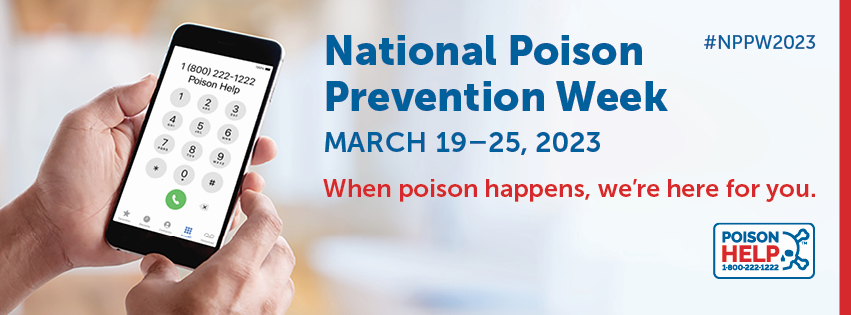When Poison Happens, We’re Here for You

When older adults hear “poison center,” their reaction is often “I don’t have kids anymore, so I don’t need them.” Many will go a step further by thinking adults “know better” and are not as prone to accidents with harmful substances.
The stereotype of a poison center caller is grounded partially in truth: close to half of the 60,000 callers we help each year at the Washington Poison Center need our treatment advice for a child younger than six. But that means over 30,000 callers are teens, adults, and older adults who had a poison emergency, such as a mistake with a medication, an accident with a household product, or an intentional use of a substance.
Everyone makes mistakes and everyone can find themselves in a poison emergency. That’s why we are here! Our free, confidential treatment services are available 24/7/365 for emergencies or safety questions.
Every year in March, we celebrate National Poison Prevention Week to raise awareness of common poisoning scenarios, strategies to stay safe, and how poison centers help. Join in on the festivities by marking down March 19–25 as the week for you to take action to improve your health and safety.
Not sure where to start? Follow our five simple steps:
- Save our number: 1-800-222-1222.
Making a mistake with a potentially harmful substance is scary, and you want to be able to act quickly. Save our number now so that you can contact our expert staff (nurses, pharmacists, and doctors) immediately. We are available 24/7 every day of the year, are always free, and we have free interpretation services available if English is not your preferred language.
- Do some spring cleaning.
Peek inside your cupboards and closets … do you have any expired or unneeded medications? Take them to a secure medicine drop box to prevent medication mistakes and intentional use by others. King County has over 100 free medicine return drop boxes located in grocery stores, pharmacies, health clinics, and police departments. Some community locations also offer mail back envelopes. Find the option closest to you at www.TakeBackYourMeds.org.
- Consider your medication practices.
If you take any medications, vitamins, or supplements, take a moment to consider if there is any room for improvement in your practices. Do you find yourself forgetting to take your medications? A medication calendar, alarms, or a reminder app on your cell phone may help. Is your medication list up to date? Double-check by comparing your list to your bottle labels. If you don’t have a list, create one using our guide and templates. Do you know if it’s safe to take over-the-counter medicines or vitamins/supplements with your prescription medicines? Give us a call if you’re not sure.
- Order Mr. Yuk stickers.
Mr. Yuk stickers aren’t just for kids! His bright green face helps differentiate “look-a-like products”—i.e., products that are difficult to tell apart based on their packaging and size. Need an example? Eye drops and super glue bottles look very similar. A common call we receive from older adults is mixing up look-a-like products when they do not put on glasses or are not paying close attention. Place Mr. Yuk stickers on harmful products as an immediate visual cue. Order stickers in a free Yuk Pak (click here).
- Check in on your friends and family.
The last few years have negatively impacted mental health for many. Like many other entities, we’ve noted increases in substance use, self-harm, and suicide. Accordingly, it’s more important than ever to check in on your friends, family, neighbors, and community members. If someone you know is struggling emotionally, help is available. Like our services, everyone can access free, confidential 24/7/365 help with emotional support and thoughts of suicide by calling 988.
If you’re looking for more information on poison safety, we will have many activities scheduled throughout National Poison Prevention Week—you can learn about them on our Facebook, Instagram, or Twitter. Have a safe and healthy week!
 Contributor Meghan King is a Public Health Education & Communications Specialist (Western Washington) with Washington Poison Center.
Contributor Meghan King is a Public Health Education & Communications Specialist (Western Washington) with Washington Poison Center.
This article originally appeared in the March 2023 issue of AgeWise King County.
![Aging & Disability Services for Seattle & King County [logo]](https://www.agingkingcounty.org/wp-content/themes/sads/images/seattle-ads-logo.png)